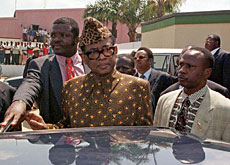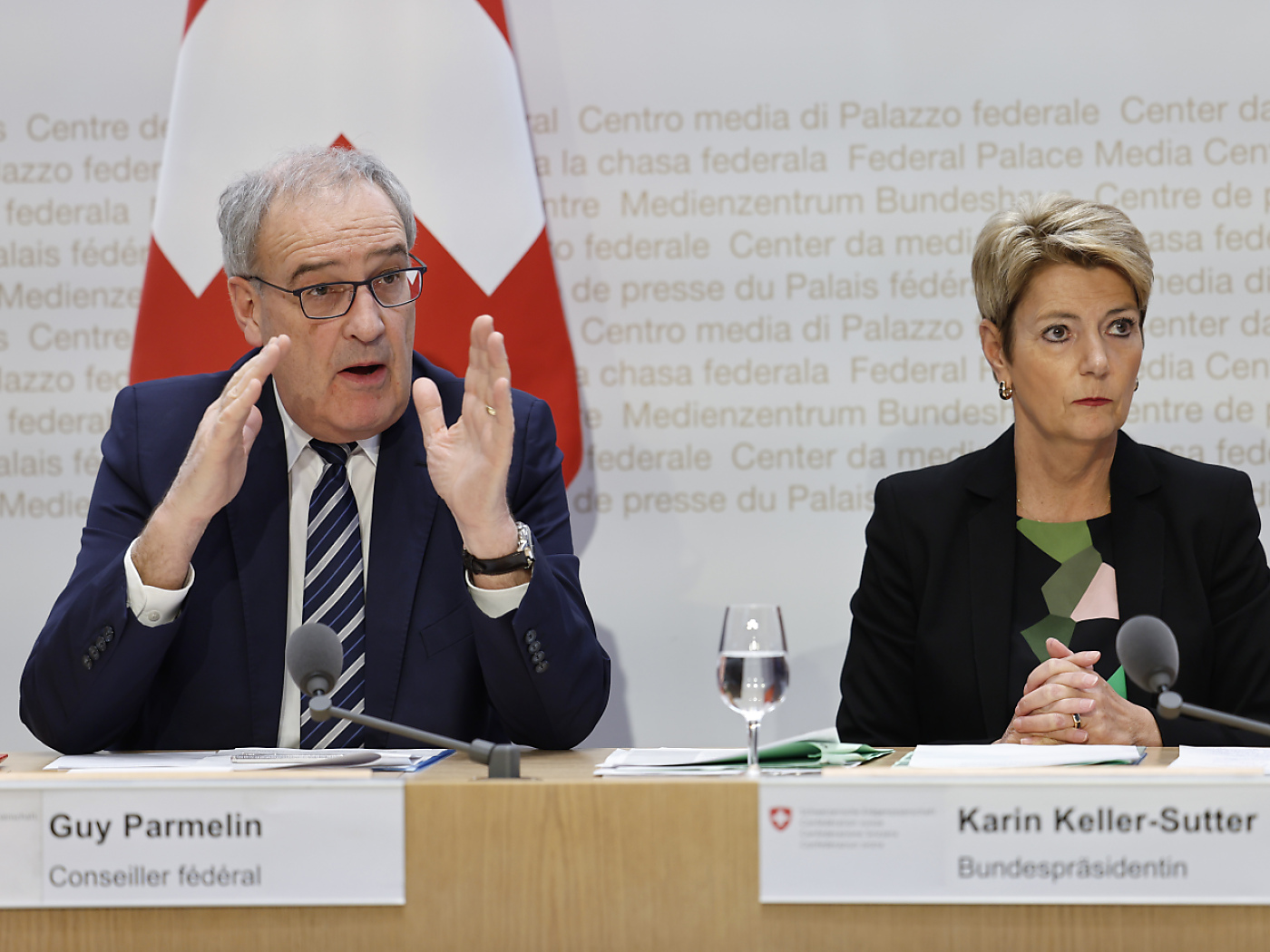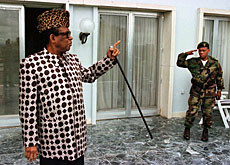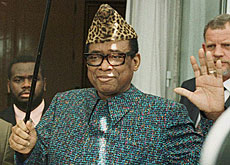Switzerland “ready to return Mobutu funds”

Swiss President Micheline Calmy-Rey has announced Switzerland is prepared to release funds belonging to the late dictator of Zaire, Mobutu Sese Seko.
But non-governmental organisations (NGOs) say they are concerned the frozen assets will be returned to Mobutu’s family – which is what will happen at the end of 2008 unless their origin can be legally determined.
Calmy-Rey made the comments on Monday in Kinshasa, capital of the Democratic Republic of Congo, during a ten-day official visit to sub-Saharan Africa.
“Among the subjects broached with President [Joseph] Kabila was the question of funds… of former Congolese dignitaries in Switzerland, particularly those of Mobutu,” she said.
Ten years ago, Switzerland blocked assets deposited by the dictator and his family worth around SFr10 million ($8.33 million), responding to a request from Zaire, since then renamed by its new leaders.
According to Calmy-Rey, there is now around SFr8 million currently frozen in Switzerland. “My country’s government is ready to return that money to the Democratic Republic of Congo,” she said.
Calmy-Rey added that she had invited the Congolese government to designate a representative in Switzerland so that a solution might be found quickly, pointing out that her country “did not hold other people’s money”.
“We returned $500 million (SFr600 million) belonging to the former Nigerian dictator Sani Abacha because we judged that the money belonged to the Nigerian people,” she said.
Cautious approval
Civil society observers cautiously welcomed Calmy-Rey’s comments, but called for the Swiss government to make sure that the SFr8 million remained frozen until its provenance could be legally proven.
“We in civil society of course also want these funds to go back to the people of the Democratic Republic of Congo, but at the moment Swiss law says that if there is no court decision [in Congo] the money can’t be given back [to the Congolese people],” André Rothenbühler from Aktion Finanzplatz Schweiz, an independent NGO that monitors the Swiss financial system, told swissinfo.
Rothenbühler wants a planned change in Swiss legislation to ensure that in cases where the criminal origins of money can be proven, it should be returned to the people of the country involved.
Switzerland abandoned its legal aid involvement in Congo in 2003 after it took the view that the Congolese authorities were not in the position to carry out legal process that fitted constitutional criteria.
Without a legal decision, Switzerland will be forced to hand back the funds to Mobutu’s family after December 31, 2008.
“If it’s not possible to have a new law by the end of 2008… we want the Swiss government to find a way of freezing this money beyond then. That’s clear,” Rothenbühler said.
Commitment
Calmy-Rey also congratulated the Congolese government for its “satisfactory” organisation of elections in 2006 and 2007, which it said had resulted in legitimate institutions, and for its efforts to reconstruct the country after two armed conflicts between 1996 and 2003 that resulted in 3.8 million deaths.
“Switzerland has committed its support to the Democratic Republic of Congo,” she said.
“I intend to present to the Swiss government and parliament a project of regional cooperation that is part of a network of cooperation concerning the development of Rwanda, Burundi and the Democratic Republic of Congo.”
Switzerland contributes SFr13 million towards the $1.5 billion budget of the United Nations Mission in the Democratic Republic of Congo (Monuc), currently the biggest peacekeeping mission worldwide.
swissinfo with agencies
By 1998 some $650 million in frozen Swiss bank deposits of the late Philippines dictator Ferdinand Marcos, who is thought to have amassed a fortune of $5-10 billion during his 20 years in power, had been handed over to the government in Manila.
In June the Swiss government extended a freeze for three months on bank accounts linked to former Haitian dictator Jean-Claude “Baby Doc” Duvalier.
The decision came days before a freeze on all the ex-president’s Swiss accounts was due to expire, which could have allowed the money to be returned to the Duvalier family.
1997: Government of the Democratic Republic of Congo requests legal assistance from Switzerland to trace alleged assets of toppled dictator Mobutu.
1997: Swiss government freezes assets worth SFr10 million deposited by Mobutu and his family.
2001: Canton Vaud approves claims by Swiss businessman from Mobutu funds for outstanding bills, but government blocks the payout.
2001: Mobutu’s villa on Lake Geneva auctioned off for SFr3.1 million.
2003: Government confirms freeze of Mobutu assets.
2006: Federal Court orders partial unfreeze of assets and payment of SFr2.35 million to Swiss businessman.
In 1965 General Mobutu Sese Seko came to power in Congo, a Belgian colony until 1960, in a coup and renamed the country Zaire in 1971.
After decades of dictatorship, Mobutu was ousted by the alliance under Laurent-Désiré Kabila who proclaimed himself president of the Democratic Republic of Congo in 1997.
Zaire’s new rulers accused Mobutu, who was forced into exile in Morocco where he died shortly afterwards, of siphoning off government funds and stashing away assets worth billions of francs in Switzerland.
When Kabila died in 2001 he was succeeded by his son, Joseph Kabila.
In response to a request for legal assistance by Kinshasa in 1997, the Swiss authorities froze SFr10 million deposited by Mobutu and his family. They also auctioned off Mobutu’s villa on Lake Geneva for an additional SFr3.1 million in 2001.

In compliance with the JTI standards
More: SWI swissinfo.ch certified by the Journalism Trust Initiative











You can find an overview of ongoing debates with our journalists here . Please join us!
If you want to start a conversation about a topic raised in this article or want to report factual errors, email us at english@swissinfo.ch.